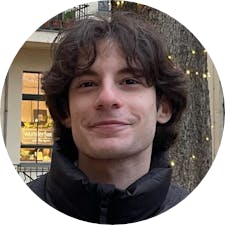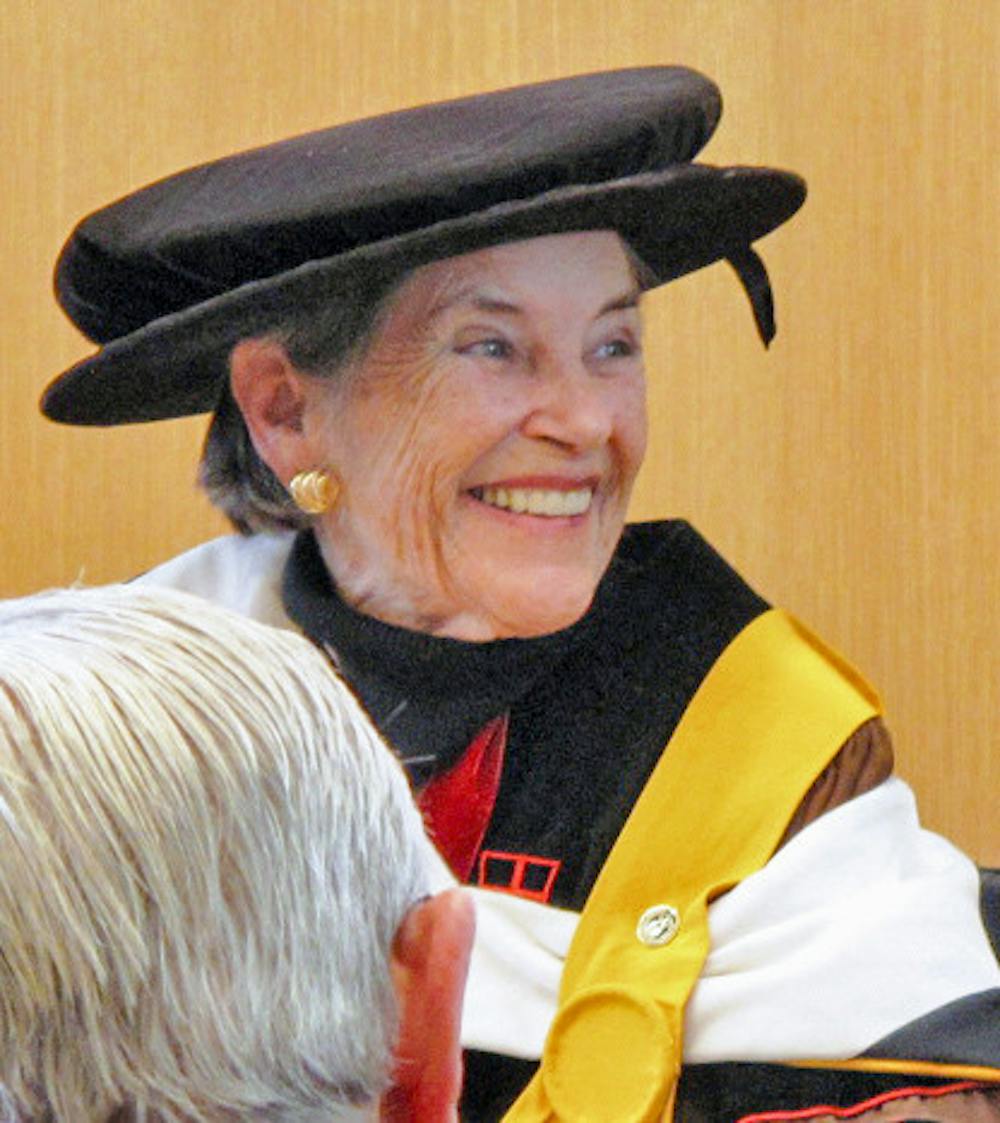Professor Emerita Martha Sharp Joukowsky ’58 P’87, who held a double appointment as professor of anthropology and archaeology and the ancient world at the University, died Jan. 7 at 85 years old.
During her professorship, Joukowsky conducted pioneering archaeological fieldwork in countries such as Jordan, where she “discovered and excavated the Great Temple at Petra,” according to a University statement released following Joukowsky’s passing.
At the University, Joukowsky was a foundational figure in establishing various academic infrastructures, including the Joukowsky Institute for Archaeology and the Ancient World, and was a major benefactor of the greater Providence community.
Joukowsky published several major works, including “A Complete Manual of Field Archaeology” in 1980 and “Breaking Ground: Pioneering Women Archaeologists” in 2006. She also held the title of president of the Archaeological Institute of America between 1989 and 1993.
In the weeks following her passing, The Herald spoke with several of Joukowsky’s family members, colleagues and friends about her legacy and character. In her passing, Joukowsky not only left behind an internationally-renowned legacy of scholarship, but also an enduring memory of her generosity, empathy and unbounded curiosity.
Lifelong dedication to scholarship
Joukowsky was “a scholar, a teacher (and) a mentor,” said her close friend Mary Hollinshead, who is a professor emerita of art history at the University of Rhode Island. “Not always in that order, you could mix it up on any given day, but she was definitely all of the above.”
She “was a lifelong student, … which made her a good teacher,” said Rebecca More MA’86 PhD’98, a visiting scholar of history and close friend of Joukowsky. “She was curious about everything. She had many, many interests way beyond her narrow field.”
Anthony Tuck PhD’96, a graduate student of Joukowksy, agreed. “Martha had this remarkable intellectual curiosity that drove her … a genuine explorer spirit,” Tuck said. “She was always pushing boundaries and finding new opportunities to discover.”
“She was just so open to people, and she told such good stories,” Gina Borromeo PhD’93, chief curator and curator of ancient art at the RISD Museum, said. Borromeo first met Joukowsky as a graduate student at the University. “Learning is made even more memorable when it’s presented in a way that it becomes a human interest story. … Whenever there was a human angle to anything, it would enter Martha’s equation.”
Those close to her distinctly remember Joukowsky’s generosity. Throughout her career and retirement, Joukowsky remained a dedicated supporter of the University.
Michael Joukowsky ’87 attributes his mother’s generosity to her fundamental belief that “education was a key part of a young person’s discovery of life and discovery of what makes you curious about life. It was that process of awakening.”
The creation of the University’s Joukowsky Institute for Archaeology and the Ancient World was made possible by “a generous gift from Martha and her husband Artemis Joukowsky,” according to the University’s statement.
The Institute’s presence has branded the University as “one of the elite leading academic institutions associated with archaeological research … in the whole world,” Tuck said.
Associate Professor of Archaeology and the Ancient World, Egyptology and Assyriology and History of Art and Architecture Laurel Bestock ’99, former student and colleague of Joukowsky, spoke further on the Institute’s impact. Joukowsky understood her own “ability to create the (Institute’s) structure and excitement, but she wanted students to carry it forward,” Bestock said. “She gave it a spirit but did not direct exactly how it should go.”
“Martha wanted her influence to be broad … to create excitement (and) make space for people (to) participate in rigorous methodology,” Bestock added.
Fostering community on campus
During her time at the University, Joukowsky remained dedicated to supporting students at all different stages and rigors of learning.
“She thought that people needed every opportunity to learn as much as possible, wherever possible,” Michael Joukowsky said.
Joukowsky was an avid supporter of Resumed Undergraduate Education, which focuses on students “who interrupted or delayed their formal education” due to personal reasons, according to the University’s admissions website.
Hollinshead recalled how the Joukowskys privately sponsored young and displaced mid-career scholars from the Middle East, “with no fanfare … without anybody knowing.”
Joukowsky was also instrumental in founding the Harriet W. Sheridan Center for Teaching and Learning, which creates “teaching and learning communities dedicated to improving learner success and supporting educators’ professional growth,” according to the Center’s website. She was the Center’s first chairman and remained deeply involved in its proceedings from 1992 to 2010, according to More.
More remembers her time working at the Center with Joukowsky fondly. “We had to have monthly meetings to get the Center established firmly, (which) included making sure there were pastries at every meeting,” More said. “There was no detail that would help people feel comfortable that was overlooked.”
Joukowsky was “dedicated to the center’s mission of supporting all the faculty, no matter what department, and graduate students,” More said. “Her goal wasn’t to fix people, but to create environments where people could find their own learning.”
Several of her friends said Joukowsky’s greatest impact is felt among the graduate students she interacted with, a community for which she sponsored numerous scholarships and dissertation prizes.
“She was such a down-to-earth person. She understood the challenges that graduate students faced, not just in research but also in financial constraints,” Bestock said.
“My first year, I was living with my friend in this unheated apartment. It was bitter cold but cost virtually nothing. She knew what the situation was, walked into our office one day and said, ‘You’re house sitting for me,’ ” letting the two stay in “her beautiful house,” Tuck said. After that, “she began advocating for higher graduate student life.”
In 2001, “I was a new graduate student of Egyptology coming from Egypt. I had no dormitory room reserved or other place to rent,” Ramadan Hussein PhD’09 wrote in an email to The Herald. Joukowsky agreed “to host me for three days … she never made me feel like I was a guest.”
“She immediately started talking about her times in Egypt, Jordan and Lebanon and shared stories with me,” Hussein added. “It was very warm reception and so comforting to feel that your host understands and appreciates your culture.”
“You would go to her house, and students would be popping in and out. Martha made her house available for students,” Borromeo recalled.
Many of her friends fondly remember Joukowsky’s love of her dogs, Lucy and Pushkin. “It was always chaotic, and the picture was never complete without her entourage of white west highland terriers,” Borromeo added.
Michael Joukowsky does not consider his mother’s generosity as charity, but rather an investment. “If you could prove to Mom that you were going to educate yourself and be responsible for yourself, then she would invest in you,” he said.
A legacy of leadership and giving
Joukowsky’s generosity to students extended beyond financial support.
“What she truly delighted in was being a magnetic force that drew people to classical archaeology and instilled in them a lifelong curiosity,” Tuck said.
“Conversations with professors can feel very one-sided. Martha was different, … she got to know students and actually remembered things about us,” Angela Murock Hussein PhD’04, a former student of Joukowsky, wrote in an email to The Herald. “It is easy to feel unseen at a new school, so Martha helped to make it feel like home.”
“Mom really liked to listen. … I think the reason why so many people fell in love with her was that she was present … the whole time,” Michael Joukowsky said.
Tuck remembers how prideful Joukowsky was that “life-long relationships had been forged in all her classes.”
“At her house, (Martha) was always making introductions and getting people talking. For students, that could be crucial to finding opportunities,” Angela Murock Hussein wrote. She “introduced a new foreign student to me at a party,” Ramadan Hussein, “since she wanted him to make friends. Two years later we got married at her house.”
Bestock commended Joukowsky’s unwavering professionalism in her relationships with students. “She was able to be close with her students without blurring the boundaries,” Bestock said. “Bridging mentoring as (I was) an undergraduate, colleague and friend showed the depth of her humanity. It was unusual.”
Joukowsky’s impact spans far beyond College Hill. She was an avid humanitarian and generous donor to the city of Providence, closely involved with the Rhode Island Committee on the Humanities, Rhode Island Philharmonic Music School and Girl Scouts of Rhode Island, according to Michael Joukowsky.
Michael Joukowsky can specifically recall his mother’s dedication to the Rhode Island School for Progressive Education, which aids the state’s public schools by “diversifying the teacher pipeline, promoting the use of anti-racist pedagogy and preparing teachers for success with high-quality clinical experiences,” according to the RISPE website.
Even while conducting her fieldwork at Petra in Jordan, Joukowsky encouraged and worked diligently with the local Bedouin women “to create their own jewelry … and help them sell it so that they could have the respect of having their own income,” Michael Joukowsky said.
While Joukowsky’s impact is undeniable, a shared sentiment that endures among those close to her, including Professor of Anthropology Patricia Rubertone, is that “Martha didn’t like to be fussed over.”
“I think she would like to be remembered as a fine archaeologist, an outstanding teacher and mentor, a friend of the University and a wonderful human being,” Rubertone added.
“I don’t believe that she would want a legacy,” Michael Joukowsky said. “I believe that what she would truly desire is for the people that she loved … (to see) something (in her) to emulate.”
“Mom will live forever, in my opinion, because of that,” Joukowsky added. “Her legacy is in the spirit and in the hearts of all of us who have been in her life.”

Alex Nadirashvili was the managing editor of multimedia and social media for The Brown Daily Herald's 133rd Editorial Board. As a former University News editor, he covered faculty, higher education and student life, though his proudest legacy is The Brown Daily Herald TikTok account.





